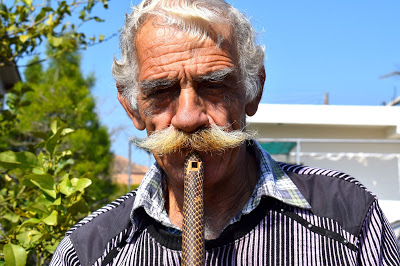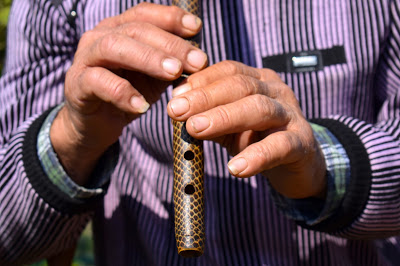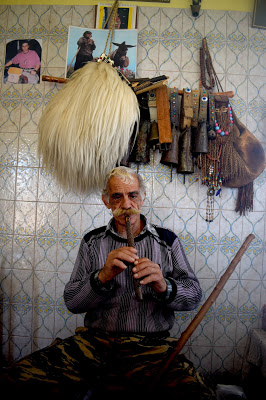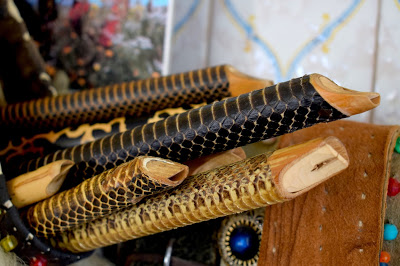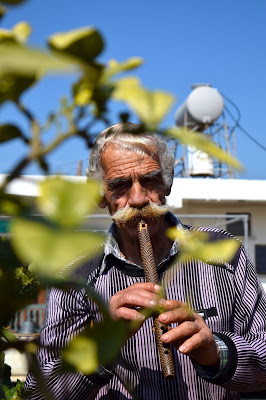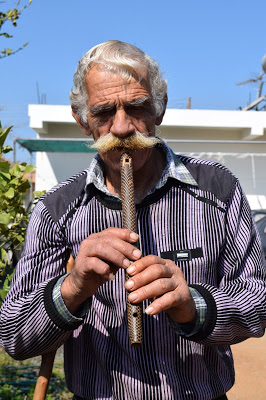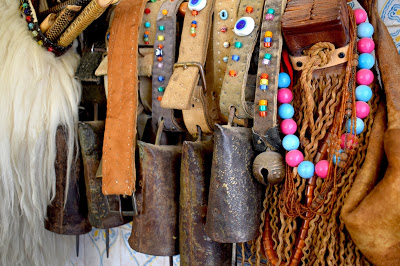Andreas Hrstakkos is one of the few people who keep Cypriot traditional music alive today. With a special physiognomy and a life full of experiences, Christakkos is today one of the most important poets of our Cypriot tradition.
He was born in 1953 in Mousulita and managed to study only until the first grade of elementary school due to the poor situation of his family, while from the age of six he worked as a shepherd and then as a butcher.
Interview with Anna Christou
Who taught you pithkiavli?
Pithkiavli has no teacher. Whatever you learn, you will learn by yourself without someone else teaching you. There may be a person who will teach you the basics, i.e. how to hold it but not how to play it, from then on everything you do you will do it yourself as long as you have the love and passion for it. To learn pithkiavli, one must start at a young age and practice continuously. If you leave the pitchfork then the pitchfork will leave you and you will forget how to play it.
I started the pithkiavli from a very young age. I didn't have a teacher. There was only one person who gave me some advice at first, and I distinctly remember him boasting in the village that he himself taught it to me and the rest of the villagers wondering how the student passed the teacher. I've had the passion since I was little, it's the truth. I always had it with me wherever I went. Even at night I had it under my pillow. I remember my forgiving mother saying to me: "It's okay, how long do you have to play?" And so I preferred to go to the plains and play there. Pithkiavli is like my drug. Just like a drug addict can't stand without his dose, so too if a day goes by and I don't play, I'll feel like I'm missing something.
Where should I die, tell the jinns to bury me
I don't want people to cry over my grave
That on the right partly I see this monkey
My vafka my verka who buys the other
How did you start chatting and what is your source of inspiration?
Tsiatsama is like the pithkiavli, it is not learned nor can you teach it. You have to have passion and a lot of imagination. From a young age I created my own songs. I have no specific inspiration. In other words, it depends on what the issue is. If they are erotic, you imagine something to have a base and the others come to you spontaneously, such as:
Today I sighed ji a brilliant turned out
as the astron essie jai esso ekevedi
If we are not found, he eats in the sense that it happened
I have kisses kept in a pot of gold
jai now before jairo,
My only one daughter, in girls' school
I have her loo jai pennia to put on my jeans when I go
As far as we know, you have been awarded many times for your contribution to the Cypriot tradition. When was the first time you received your first prize?
First time I got my first prize was when I participated in a competition. I was around fourteen at the time, and I was the youngest of the contestants. As soon as I saw the others I was sure that I would win, but I lost faith when I competed against a very strong opponent several years older than me. Nevertheless I managed to win leaving the jury wondering if those songs I sang were mine. My uncle then assured them that they were all mine and I confess to saying that from then on I took courage.
Tell us an incident that happened to you and you will not forget it.
I have many incidents to tell you, but one that has been engraved in me is the following: I was ten years old when I went with my older brother to collect the so-called "smurfs" that were frequent in pits. I, in my naivety, went down to one of those which was quite deep. After collecting the smurfs, I couldn't get up the stairs. Meanwhile my brother senselessly left the field thinking I had returned home. But when he also went home and didn't see me there, he and my father started looking for me in all the pits. While night fell I cried with all my might but in vain, for that pit was the only one they did not suspect. The next day I heard the "chakarkas" (bells) of the sheep and continued to call but again no response. When my uncle Prigopoulos asked if my parents searched in all the pits, my father answered "yes" without thinking about it. But then he thought again and remembered that they didn't. So they went to that particular pit and found me. As soon as I heard my uncle's voice calling me, I woke up. The last thing I remember is my uncle telling me "you're scared" and my father saying "he's still good". I remember as soon as they took me out I passed out.
Another incident that happened to me that I will not forget was the earthquake in 1963 when I was eleven years old, that is, the very next year after the previous incident. Dawn of the Cross. I was alone with an acquaintance of ours when suddenly a strong wind blew from the north. The old man understood that something was going to happen tonight. In the silk taxi, to warm myself, I entered the isaji of the gadarus to warm myself while the earthquake started. Then the old man grabbed me and took me somewhere safe. My father came anxiously and I distinctly remember the old man saying to him: "Come in, I saved your son."
Tell us a couplet that characterizes you.
Suffering pains and woes
Pharmacists sighs that my body is tired
They tremble and tremble, the earth trembles on her wound
But my momentum stopped.
Interview: Anna Christou
Photos: Marinos Pavlikkas
